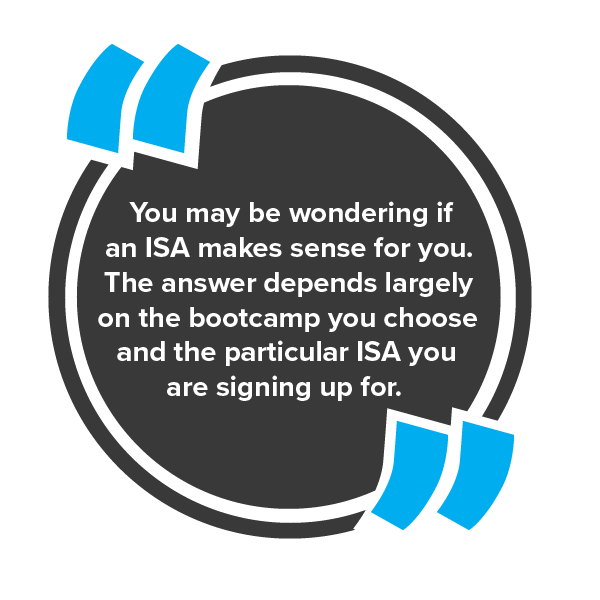What to Look for in an ISA
Income Share Agreements (ISAs) have become increasingly popular among coding bootcamps and have even gained adoption among more traditional institutions of higher education. As a potential bootcamp student, you may be wondering if an ISA makes sense for you. The answer depends largely on the bootcamp you choose and the particular ISA you are signing up for. Before deciding on an ISA, it’s important to examine all available options to pay for a bootcamp. If you choose to pay for a bootcamp with an ISA, here are things to consider:

Payment Cap
Say your bootcamp experience goes well and you graduate and get a great paying job. The payment cap is themaximum amount you must pay back. Typically, this is a multiple of tuition. While each ISA program is different, the low end of the cap is usually 1.5x tuition, but that can climb as high as 2.5x. So while you get the benefit of not having to pay if you can’t land a good paying job, under an ISA, you may have to pay back double the original tuition cost, which would surely be more than the total cost of principal and interest on a loan.
At Tech Elevator, our cap is 1.5x the tuition amount less a $2,000 upfront deposit. A 1.5x cap is among the friendliest in the bootcamp industry, and ensures that students will never have to pay more than that amount. If you reach the cap in less than 48 monthly payments, you will fulfill your ISA obligation and no longer need to make any payments.
Income Share
The income share is the percentage of your income that you will pay monthly under an ISA. The longer the agreement lasts, the smaller the income share typically is. For example, a 2-year ISA will have a higher income share percentage than a 4-year ISA. In some cases, as much as 17% of your monthly pre-tax income will go towards paying back an ISA. That might mean that your rent or mortgage is the only thing that eats up more of your monthly income than the ISA.
At Tech Elevator, we understand students have other obligations in their lives and we want to ensure that they are not overly burdened by ISA payments in their first months of employment. We believe that a 10% income share over the course of 48 monthly payments allows graduates the flexibility to adjust to their new financial circumstances without paying too much of their income towards an ISA.
Up-front tuition vs. ISA tuition
Something to beware of when looking at ISAs is the tuition price. Some educators will charge a lower amount for tuition “upfront” either paid via cash or loan. They may even frame it as a “discount” for paying upfront, but in reality it functions as an additional burden on students who use ISAs. If the upfront price is $2,000 less than the ISA price, that means you could actually end up having to pay back an additional $4,000 depending on the cap, none of which you would have owed if you had just paid tuition using a loan.
At Tech Elevator, we require a $2,000 upfront deposit for students pursuing an ISA. The Tech Elevator ISA will be based on our tuition amount of $16,500 minus the $2,000 deposit. This means that the total ISA amount will be $13,500 and the 1.5x payment cap will be based off of $13,500 – meaning that a Tech Elevator graduate will never pay more than $22,925 for their ISA.
The ISA tuition plan is currently only available for Tech Elevator’s Full-Time Program. ISA plans are not available for residents of: Alabama, California, Colorado, Iowa, Illinois, Maine, New York, South Carolina, Washington D.C. or Washington. Read more information on Stride Funding’s Privacy Policy
Minimum Income Threshold
The minimum income threshold is designed to protect students in an ISA from being stuck with payments when they haven’t landed a good job. While this is most often the case, it’s important to consider what the minimum income threshold is for each bootcamp and if that is high enough to afford the cost of living in your area while making ISA payments. Also, note that even if you attend a coding bootcamp but don’t land a coding job, you are still liable to make ISA payments if you start making more than the threshold.
At Tech Elevator, our minimum income threshold is $40,000. This figure is higher than the average salary of students before they enroll in Tech Elevator and is also above the national median income.
Our coding bootcamp has helped over 3,500 career changers learn to code and land fulfilling jobs in tech. We provide the highest quality learning and career prep experience delivered in both in-person and virtual classrooms.